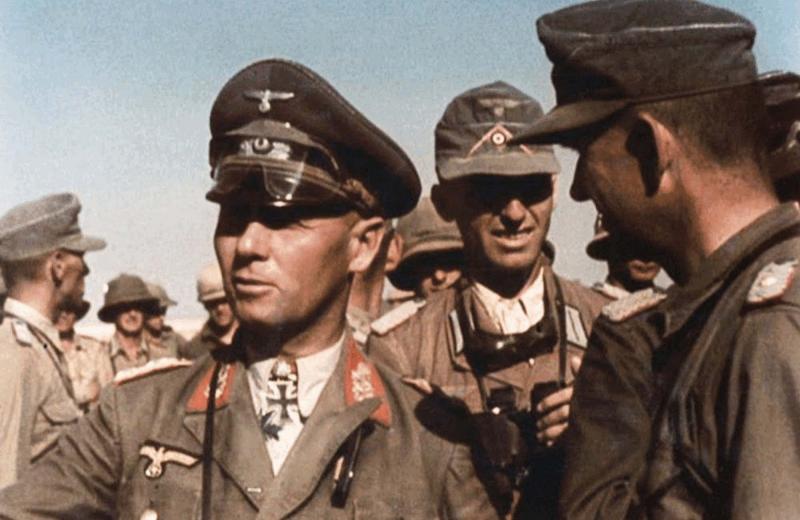DESERT FOX: ERWIN ROMMEL
He was born on 15 November 1891 in the Kingdom of Württemberg, which was part of the German Empire. His full name is Johannes Erwin Eugen Rommel.
When he was only fourteen years old, he built a full-scale glider with a friend. Young Erwin had the idea of becoming an engineer at that time, but in 1910, at his father's insistence, he joined the 124th Württemberg Infantry Regiment as an officer candidate and was then sent to the Officer Preparatory School in Danzig.  He graduated from school in November 1911. In January 1912, he achieved the rank of lieutenant. Rommel, who was a battalion commander before the war, taught at the Dresden Infantry School from 1929 to 1933 and at the Potsdam War Academy from 1935 to 1939.
He graduated from school in November 1911. In January 1912, he achieved the rank of lieutenant. Rommel, who was a battalion commander before the war, taught at the Dresden Infantry School from 1929 to 1933 and at the Potsdam War Academy from 1935 to 1939.
He published his book Infanterie greift an (Infantry Attack), in which he wrote about his wartime experiences and analysis, in 1937. He attracted the attention of Adolf Hitler with his work and he was appointed as the commander responsible for the education of the "Hitler Youth".
In 1938, Rommel, who had the rank of colonel, was appointed as the commander of the War Academy in Wiener Neustadt. While he was here, he wrote his book Panzer greift an (Tank Attack), which was the continuation of his previous book. After a while, he was dismissed from his position and became the commander of Hitler's special protection battalion.
He was appointed Commander of the 7th Panzer Division before the start of the French occupation in 1940. The division in question later became known as the "Ghost Division". Because it was difficult to determine the position of the very agile and fast-moving division on the maps. Rommel proved how successful he was in this task. He also successfully repelled a counter-attack by the British Overseas Expeditionary Force. The first unit to cross the Meuse River was Rommel's unit. 
One of the first German units to reach the English Channel was the 7th Panzer Division. Here he captured the vital Cherbourg Port. As a reward, Rommel received a promotion and was appointed Commander of the 5th Light Division (subsequently converted into the 21st Panzer Division) and the 15th Panzer Division, which were deployed to Libya in early 1941 to aid the defeated and demoralized Italians. The German Afrika Korps (Deutsches Afrika Korps) was formed. Africa became the place where Rommel became famous as a commander. Rommel spent most of 1941 forming his own organization and rallying Italian troops that had been dispersed by serial defeats against British forces under the command of Brigadier General Richard O'Connor.
Rommel, who was originally sent to help the defense here, led the British forces, which were many times superior to him, and followed them to El Alamein. After these actions, he was given the famous nickname "Desert Fox". Rommel used numerous diversions. Some of those; He tied twigs to the backs of tanks and vehicles and added dust to them. The British, who saw this, retreated, thinking that a very large force was attacking them. He buried half of the 88-gun guns in the ground and gave a bad surprise to the approaching British. In order to mislead mine detectors, he had cans buried next to each mine. Sometimes he turned vehicles into tanks from wood. With a successful attack, British troops were taken out of Libya, but the attack ended a short distance from Egypt, and although Tobruk Port was besieged, it remained in the hands of the allied forces under the command of Australian General Leslie Morshead. 
General Archibald Wavell, Commander of the Allied Forces, made two attacks (Operation Brevity and Operation Battle Axe) to break the siege, but these failed. After the failure of the costly Operation Battle Axe, General Claude Auchinleck, Commander of British Troops in India, was appointed to replace Wavell. Auchinleck was successful by launching Operation Crusade on 18 November 1941 to liberate Tobruk. Crusader was a defeat for Rommel, who ordered all his troops to withdraw on 7 December 1941. Seeing that Italian and German troops were withdrawing from the vicinity of Tobruk, Auchinleck decided to follow these troops in order to extend the success. Rommel, whose troops withdrew in an orderly manner, turned back his troops on January 20, 1942, and launched an attack against the allied forces that followed them. British forces had to take a defensive position in Tobruk against this unexpected attack.
Rommel used the classic blitzkrieg tactic and attacked on May 24, 1942. In Gazzala, he launched an encirclement operation that surrounded the British forces from outside his flank. This encirclement operation left the strong troops in Bir-Hakeim unable to defend their positions. Thus, the British troops quickly retreated to escape the seemingly inevitable siege. As a result of Rommel's attack, Tobruk remained besieged and remained the only obstacle between the African Forces and Egypt. In January 1942, upon Rommel's instructions, a news report (Rommel was preparing to withdraw.
Finally, thank you for listening to me, please do not forget to comment and like.


































